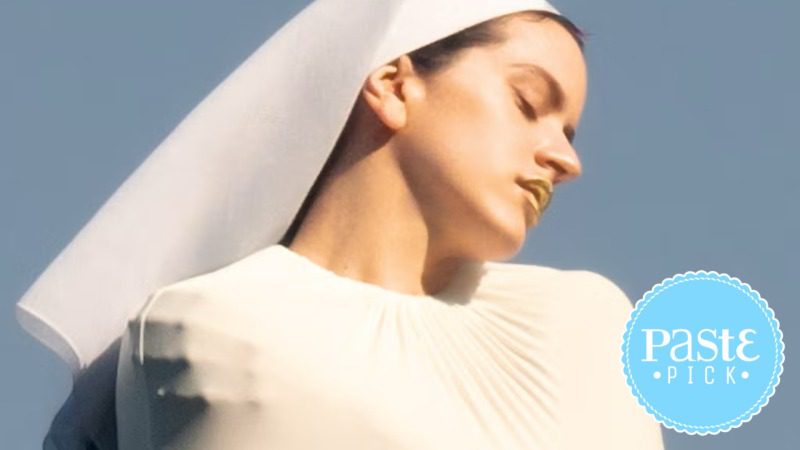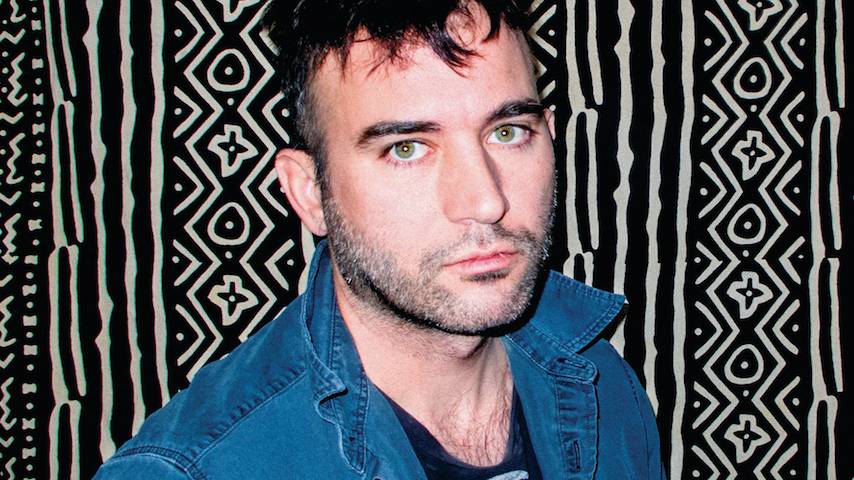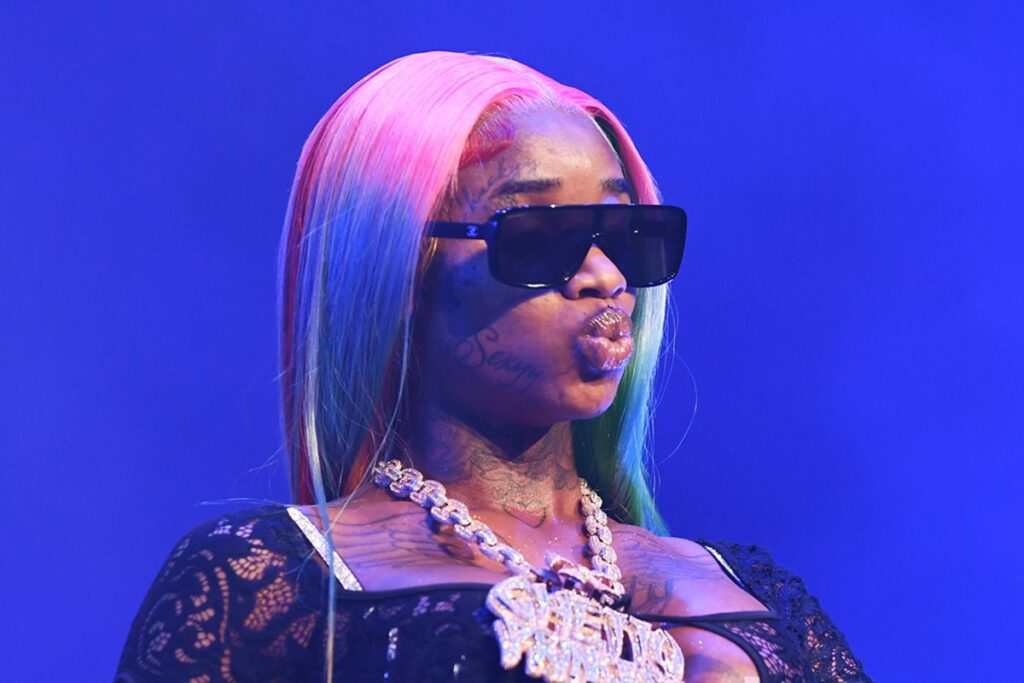To make LUX, ROSALÍA began by reading hagiographies of female saints. “Making albums for me is like excuses to do what I actually want to be doing,” she told the The New York Times earlier this month, and for the 33-year-old Catalan superstar, that simply meant reading. She studied up on saints such as Hildegard of Bingen, Joan of Arc, Claire d’Assise, and Rosalie de Palerme; she pored through the lives of Olga of Kyiv—an Eastern Orthodox saint who slaughtered thousands of men from the tribe responsible for her husband’s death—and the Buddhist nun Vimala, who was a prostitute before eventually becoming a poet and a nun. These were women—totally unconventional, often tragic—that challenged ROSALÍA’s ideas of sainthood and offered an unorthodox view of holiness.
And unorthodoxy, of course, has always been ROSALÍA’s modus operandi. Her 2018 breakout album, El Mal Querer, catapulted her onto an international stage by reinventing flamenco with slinky electronic production. 2022’s MOTOMAMI, meanwhile, broke the mold by collaging and remixing an eclectic array of Caribbean genres, from reggaeton to dembow to bachata. LUX, ROSALÍA’s fourth album, continues this trend of constant artistic transformation. Rife with strings as stormy as Vivaldi’s and vocal performances as dramatic as Carl Orff’s cantatas, this ambitious avant-pop work could be categorized as classical above all else. Yet, in the lineage of artists such as Kate Bush, FKA twigs, and Björk—who features on the track “BERGHAIN” and can be seen as a patron saint for this type of pop experimentation—ROSALÍA appears uninterested in these cumbersome musical boundaries, soaring instead towards a far more elusive, fearless vision of what pop can be. Yes, she’s working with the London Symphony Orchestra, but she’s also calling on producers like Noah Goldstein (Yeezus, Blonde) and Dylan Wiggins (SZA, Justin Bieber). Divided across four movements and sung in 13 different languages, LUX is an explosive, experimental album that demands a lot from its listeners, but not without offering resplendent gifts of beauty, drama, and grace.
LUX’s themes float around love, God, faith, and the divine feminine, and the album’s cover—ROSALÍA in a skin-tight habit, eyes closed in sensuous devotion, hitting that Sade Love Deluxe pose—should give good indication of its preoccupation with what is both bodily and holy. During the leadup to LUX, ROSALÍA devoured the works of cult feminist writers including Simone Weil, Clarice Lispector, and Chris Kraus. Much like these women, ROSALÍA is concerned with questions of the mystical and the erotic, and here in LUX, desire—despite all its chaos and brutalities—is undeniably divine. On the glistening and ghostly “Divinize,” ROSALÍA whispers over pulsing kick drums, “Through my body, you can see the light” and “Pray on my spine, it’s a rosary.” And “Reliquia,” which opens with jaunty strings, sees ROSALÍA losing parts of herself across the world—her tongue in Paris, her time in LA, her heels in Milan, her smile in the UK—much like saints’ relics; yet ultimately, she offers her own heart for both love and veneration: “But my heart has never been mine, I always give it away, oh / Take a piece of me, keep it for when I’m gone / I’ll be your relic.”
The album’s soundscapes are lush and symphonic, for sure, but ROSALÍA continues to draw from her entire artistic repertoire, making LUX seem less like the classical antithesis to her oeuvre and more like the synthesis of everything that’s come before. MOTOMAMI-esque electronic production—from the scuzzy bassline and AutoTune-crunched vocals of “Porcelana” to the scrambled, glitchy breakdown at the end of “Reliquia”—grounds the operatics, fusing the hedonistic with the heavenly. Other tracks borrow from the flamenco world of El Mal Querer: “La Rumba Del Perdón” places ROSALÍA alongside legends Silvia Pérez Cruz and Estrella Morente, and on “Madruga,” charging strings find their opposing force in palmas and heavy panting as ROSALÍA spins a tale of revenge and divine fury.
Despite all the symphonics and electronics, the album’s theatrics never overshadow its most tremendous instrument: ROSALÍA’s voice, which shines over this lush backdrop. She intones from the heavens over a thunderous cloud of choir and strings on “Mio Cristo Piange Diamanti,” declaring the power of God’s grace. And on the beautiful piano ballad “Sauvignon Blanc,” her pristine soprano soars as she promises to relinquish everything—Jimmy Choos, a Rolls-Royce, pearls and caviar—for love. The song draws from the story of Teresa of Ávila, who gave up her earthly possessions to follow God. It feels like the pious older sister to MOTOMAMI’s horny “HENTAI,” yet the two tracks are perhaps surprisingly similar, matched both by their yearning balladry and the depth of their devotion. Then there are all those other delightful details throughout the album: ROSALÍA’s harmonizing alongside Portuguese fado singer Carminho on “Memória,” her plaintive melismas in “Magnolias,” and even her witchy Latin rapping on “Porcelana”.
On “La Yugular,” ROSALÍA samples a 1976 Patti Smith interview, where the punk rocker and poet says, “Seven heavens—big deal! I wanna see the eighth heaven, tenth heaven, thousandth heaven. You know, it’s like, break on through the other side.” Smith was discussing how important it was for artists not to merely rest on their laurels but to instead push themselves to keep evolving and searching for more. It’s no wonder ROSALÍA clipped those lines; their message feels fitting for LUX, an album that is so insistent in its demands for more, more, more of everything: more reinvention, more pop, more devotion, more heavens, more love.
Lydia Wei is a writer based in DC. Her work has appeared in The Guardian, Washingtonian, Washington City Paper, and other publications. You can find her on Twitter @999orangejuice.




